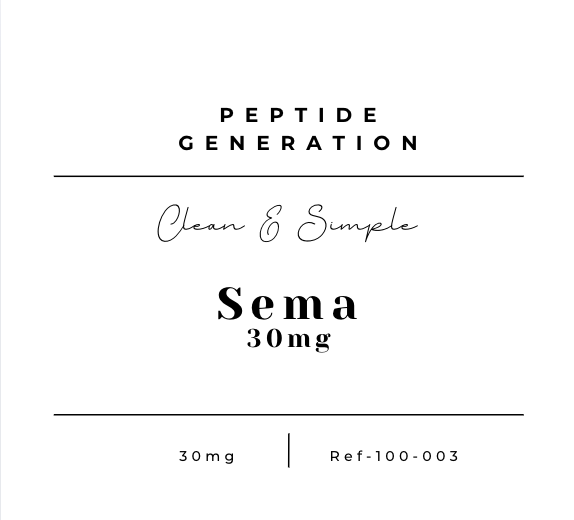 Image 1 of 1
Image 1 of 1


Sema 30mg
🔬 What Is Semaglutide?
Semaglutide is a GLP-1 receptor agonist (incretin mimetic).
It mimics the hormone GLP-1, which helps regulate blood sugar and appetite.
Brand names & approvals:
Ozempic → FDA-approved for type 2 diabetes (2017).
Rybelsus → oral tablet version, FDA-approved for type 2 diabetes (2019).
Wegovy → FDA-approved for chronic weight management (2021).
⚙️ Mechanism of Action
Stimulates insulin secretion (glucose-dependent).
Suppresses glucagon secretion.
Slows gastric emptying, prolonging satiety.
Acts on the brain’s appetite centers, reducing hunger and food cravings.
📊 Clinical Benefits
Type 2 Diabetes
Lowers A1C by ~1.0–1.5%.
Reduces fasting and post-meal glucose.
Weight Loss (Wegovy data)
STEP trials (68 weeks):
Average 15% body weight reduction at the 2.4 mg weekly dose.
Many participants lost >20% of body weight.
Cardiovascular Protection
Reduces risk of major adverse cardiovascular events (MACE) in people with T2D and heart disease.
In 2023, FDA approved Wegovy for CV risk reduction in overweight/obese patients with established heart disease.
⚠️ Side Effects
Most common:
Nausea, vomiting, diarrhea, constipation.
Decreased appetite (expected effect).
Other considerations:
Rare: pancreatitis, gallbladder disease, GI obstruction.
Can increase risk of thyroid C-cell tumors in rodents (contraindicated in patients with personal/family history of medullary thyroid carcinoma or MEN2).
May worsen diabetic retinopathy in those with pre-existing disease.
✅ Key Takeaways
Semaglutide = GLP-1 receptor agonist.
Approved as Ozempic (T2D), Wegovy (obesity), Rybelsus (oral).
Efficacy:
A1C reduction: ~1–1.5%.
Weight loss: ~15% at 2.4 mg weekly.
Dosing: Weekly injections (0.25 → 2.4 mg) or daily oral (3–14 mg).
Side effects: Mostly GI; long-term concerns about thyroid, gallbladder, and pancreas (rare).
🔬 What Is Semaglutide?
Semaglutide is a GLP-1 receptor agonist (incretin mimetic).
It mimics the hormone GLP-1, which helps regulate blood sugar and appetite.
Brand names & approvals:
Ozempic → FDA-approved for type 2 diabetes (2017).
Rybelsus → oral tablet version, FDA-approved for type 2 diabetes (2019).
Wegovy → FDA-approved for chronic weight management (2021).
⚙️ Mechanism of Action
Stimulates insulin secretion (glucose-dependent).
Suppresses glucagon secretion.
Slows gastric emptying, prolonging satiety.
Acts on the brain’s appetite centers, reducing hunger and food cravings.
📊 Clinical Benefits
Type 2 Diabetes
Lowers A1C by ~1.0–1.5%.
Reduces fasting and post-meal glucose.
Weight Loss (Wegovy data)
STEP trials (68 weeks):
Average 15% body weight reduction at the 2.4 mg weekly dose.
Many participants lost >20% of body weight.
Cardiovascular Protection
Reduces risk of major adverse cardiovascular events (MACE) in people with T2D and heart disease.
In 2023, FDA approved Wegovy for CV risk reduction in overweight/obese patients with established heart disease.
⚠️ Side Effects
Most common:
Nausea, vomiting, diarrhea, constipation.
Decreased appetite (expected effect).
Other considerations:
Rare: pancreatitis, gallbladder disease, GI obstruction.
Can increase risk of thyroid C-cell tumors in rodents (contraindicated in patients with personal/family history of medullary thyroid carcinoma or MEN2).
May worsen diabetic retinopathy in those with pre-existing disease.
✅ Key Takeaways
Semaglutide = GLP-1 receptor agonist.
Approved as Ozempic (T2D), Wegovy (obesity), Rybelsus (oral).
Efficacy:
A1C reduction: ~1–1.5%.
Weight loss: ~15% at 2.4 mg weekly.
Dosing: Weekly injections (0.25 → 2.4 mg) or daily oral (3–14 mg).
Side effects: Mostly GI; long-term concerns about thyroid, gallbladder, and pancreas (rare).

